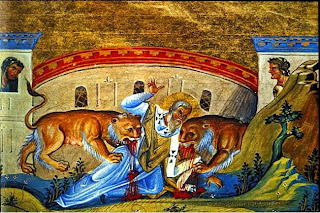The beginning of the chapter from which our First Reading is taken opens with the grumbling of the followers of Moses, because they were thirsty and God provided for them eventually. They had put God to the test by complaining to Moses who in turn prayed for flowing help.
The second half of this chapter is a win-lose proposition. The Amorites, ancient enemies of Israel, under the leadership of Amalek, came to wage war against God’s people. We hear Moses giving Joshua a battle plan, or at least an instruction to “Go get em!” Moses planned to sit up in the hillside bleachers and watch. Watching wasn’t enough, so Moses stretched out his arms and somehow that worked to the advantage of the Israelites. His arms in prayer grew weary and when they dropped so did the fortunes of the Israelites. So Aaron and Hur held up the praying arms and the victory in arms was rendered to the Jews.
The Gospel readings for the next two weekends will be centered about the theme of praying. They follow closely the final verses of the previous chapter in Luke’s account. The “kingdom of God” or “the day of the coming” are of considerable interest to the Pharisees and too, the disciples of Jesus. They do not get a direct “calendar date” answer, but are invited to watch and trust. It is into this context that the subject of prayer is inserted.
Often in the Hebrew Scriptures special care is urged for the traveler, the children, and the widow. Cf. Dueteronomy 27, 19
The first verse sets the tone. The story is addressed to the disciples lest they grow tired of the above-mentioned watching and praying. The judge of the story is a person known in the community as a person who is to care especially for the “widows”. The widow is seeking the just execution of her rights. The judge pays little attention to her banging at his door until he figures out that she might break down the door and literally “give him a black eye”. So rather than the door giving in to her pounding, he, in self-protection, gives in.
The last verse is the important one for the disciples and for us to hear. “But when the Son of Man comes, will He find faith on earth?” This is not a story about praying until we get what we want. It is an encouragement to pray so that we might wait and watch for all of God’s comings and goings. It is about the aspect of faith which goes beyond believing in God as a dogmatic truism. It is about believing that the loving God cannot be manipulated like a loving father can be by the winking of his precious little daughter.
We do ask the very good question about why should we pray at all. Is there a mystical number of askings and we tire God out and bingo, here it is! Is there a certain set of words which trips the benevolent bucket? People ask me, a priest, to pray for them as if God has a special ear for priestly prayers. I do say I will pray for them, and that is exactly what I do. I pray that they take their situation to a prayer of watching and waiting for God’s presence rather than presents. What Jesus is asking of the disciples is a faith that combines with hope.
We are generally pragmatists. We put in time, effort, words, works, thought, creativity and expect - yes - demand results pdq! This is not faith, it is business. Apparently God is presently out of that kind of business and into personal and communal relating.
Why are we called to pray? We pray so that we can experience our central human truths. We are not God. We are limited. We desire union, peace, and joy. We love being human until we experience needs, losses, injuries, and fears. We are invited to kneel right down in the midst of it all and have faith, which is not always pragmatically available and not to our liking. We pray to announce our dependencies and our truth that faith, hope, watching and waiting are those things which Jesus is asking for of the disciples.
(Adapted from Larry Gillick, S.J.)






